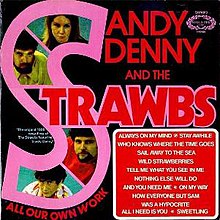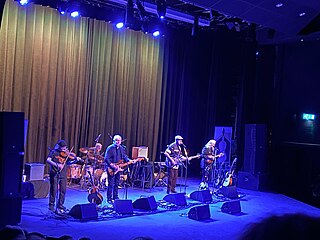
Fairport Convention are an English folk rock band, formed in 1967 by guitarists Richard Thompson and Simon Nicol, bassist Ashley Hutchings and drummer Shaun Frater. They started out influenced by American folk rock, with a set list dominated by Bob Dylan and Joni Mitchell songs and a sound that earned them the nickname "the British Jefferson Airplane". Vocalists Judy Dyble and Iain Matthews joined them before the recording of their self-titled debut in 1968; afterwards, Dyble was replaced by Sandy Denny, with Matthews later leaving during the recording of their third album.

Alexandra Elene MacLean Denny was an English singer-songwriter who was lead singer of the British folk rock band Fairport Convention. She has been described as "the pre-eminent British folk rock singer".
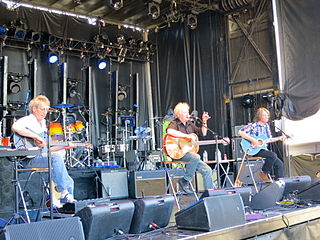
The Strawbs are an English rock band founded in 1964 as the Strawberry Hill Boys. The band started out as a bluegrass group, but eventually moved on to other styles such as folk rock and progressive rock.
"Who Knows Where the Time Goes?" is a song written by the English folk-rock singer and songwriter Sandy Denny.

Grave New World is the fourth studio album by English band Strawbs, their fifth overall. It was the first album to be released after the departure of Rick Wakeman, who was replaced by Blue Weaver, late of Amen Corner.

Deadlines is the twelfth studio album by English band Strawbs.
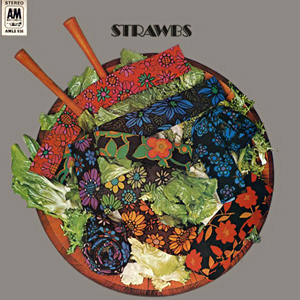
Strawbs is the first album released by the English band Strawbs. The Sandy Denny & The Strawbs LP All Our Own Work was recorded earlier, but not released until 1973.
"Here It Comes" is a song by the English band Strawbs. It did not appear on any of their studio albums, but it was included on two compilation albums: Strawbs by Choice and Halcyon Days. Written by bandleader Dave Cousins, "Here It Comes" shows definite pop influences and a more commercial view to song-writing, a trait that would extend to the next single, "Lay Down".

Strawberry Sampler Number 1 is a demo album by English band Strawbs. It was originally released as a publisher's demonstration record, intended to advertise Dave Cousins's and Tony Hooper's songs to other artists. Most of the songs were re-recorded by the band on later albums.

Ringing Down the Years is the fourteenth studio album by English band Strawbs. The album was released initially only in Canada. Because of the record company's request that a Canadian song be included on the album, the track "Might as Well Be on Mars" written by members of the Pukka Orchestra was included.
Anthony Hooper was an English folk singer-songwriter and musician. He was best known as a founder-member of Strawbs together with Dave Cousins and double bassist Ron Chesterman. He left The Strawbs in 1972 after their album Grave New World, when it became obvious that the band was moving further away from its folk roots towards rock and progressive rock. He rejoined for a 10-year stint in 1983. Hooper had been the guitarist in the Ceilidh and barn dance band, Pitchfork, since 1986, and was also a member of Misalliance.
Ronald George Arthur Chesterman was an English musician. He is best known as the original double bass player with the Strawberry Hills Boys, starring Dave Cousins on guitar, dulcimer, banjo and vocals, Tony Hooper on guitar and vocals and Ron himself on double bass. They kept that name from 1964 when they formed until June 1967, when they were giving a concert and needed to put the name of the band on stage, so they became The Strawbs. Later, after he left the band, he became a county archivist in Chester.

A Taste of Strawbs is a box-set album by Strawbs. Instead of being a "best of" album, the compilers have attempted to present alternative versions of some well-known songs plus some previously unreleased material. Included are some very old songs by The Strawberry Hill Boys, with Dave Cousins, Tony Hooper and Ron Chesterman, also are some very interesting songs by Sandy Denny and The Strawbs, and outtakes from different periods of the band's career.
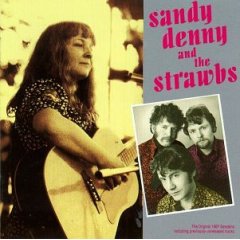
Sandy Denny and the Strawbs is a compilation album of songs by Sandy Denny and Strawbs. The album is a reworking of tapes recorded by the band in Copenhagen in July 1967. Tracks from those recordings were first released on the Pickwick budget label in 1973 under the name All Our Own Work. The track listing on this album is slightly different and some of the songs have the original string arrangements that also were recorded in 1967.

Uncanned Preserves is a compilation album of songs by Strawbs. Some tracks, however, were not released on studio albums. The recordings themselves are demos dating from the mid to late '60's.

It's Sandy Denny is a compilation album, issued in 1970. It consists of songs Sandy Denny recorded for Saga Records in 1967, and which were initially released on two separate albums: Alex Campbell and his Friends and Sandy and Johnny.

Who Knows Where the Time Goes? is a retrospective compilation of the work of English folk rock singer Sandy Denny issued in 1985. It is a four LP boxed set released on the Island Records label in the UK and Germany and on Hannibal/Carthage Records in the US, later reissued as a three CD set. It includes released and previously unreleased recordings from 1967 to 1977, live performances, outtakes and demos from Denny's solo career, and with Fairport Convention, Fotheringay and Strawbs.

Gold Dust is a live album by the late English folk rock singer Sandy Denny. It documents one of Denny's last public performances and was recorded at London's "Sound Circus" venue at the Royalty Theatre, Portugal Street, near Aldwych, London on 27 November 1977. The album features many of her classic songs both as a solo artist and as a member of Fairport Convention and Fotheringay and remains the most extensive documentation of Sandy's live work with a backing band. The album was not released on the label originally planned owing to stated technical problems with the master tape, and was only released on a different label twenty years after her death after various guitar and backing vocal tracks parts were re-recorded by Jerry Donahue and others.
The Sandy Denny discography chronicles the output of British folk rock singer Sandy Denny. Her brief career, spanning 1967 to 1978, saw the release of 4 solo albums and 4 singles on several record labels.
